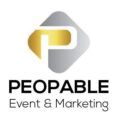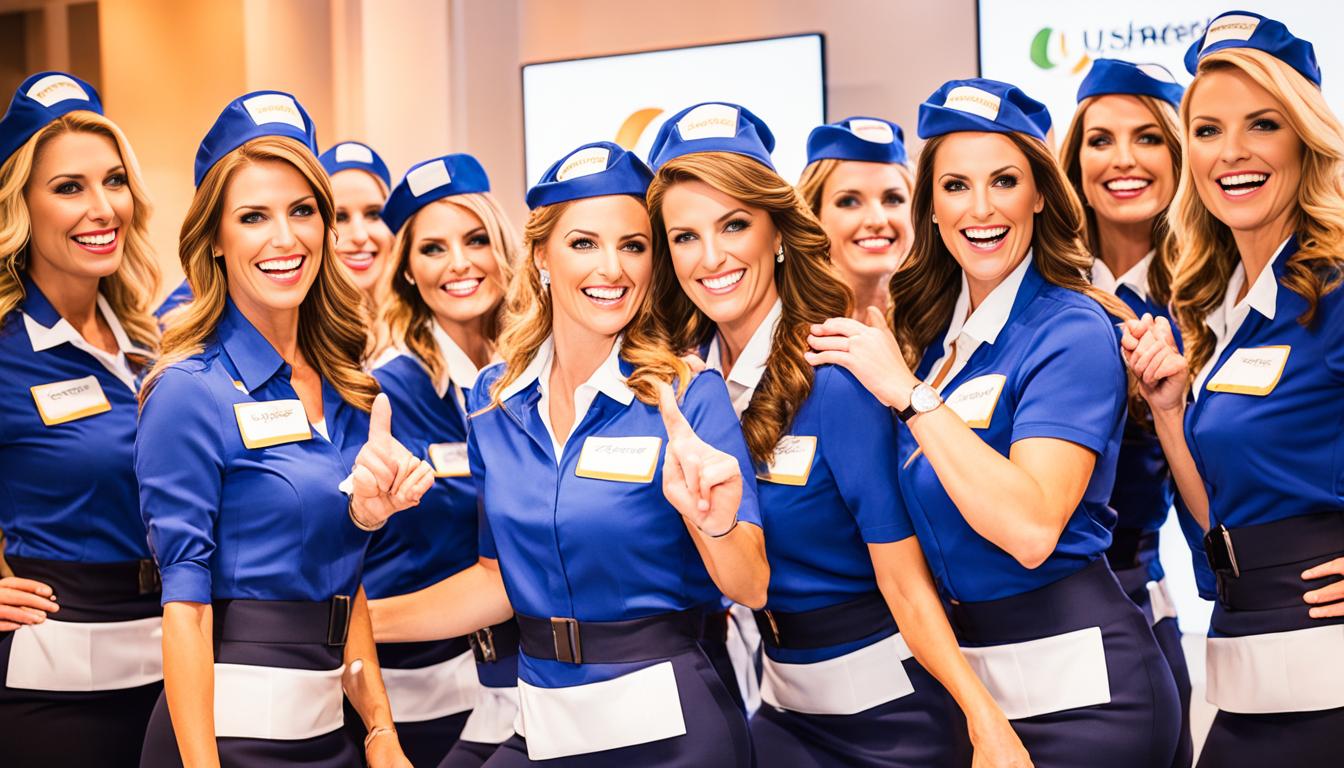In the world of events, success depends on both the experience and the marketing. Organizing events like conferences or trade shows needs effective marketing. This can significantly boost attendance, engagement, and the event’s impact.
Event marketing is how organizers promote their events. Even if aimed at the same people, events can vary widely in success. The right strategy makes your event not just known but also draws people in to take part.
Marketing events well involves creativity, strategic planning, and being ready to adapt. To make your event memorable, various marketing approaches are available. This includes experiences that grab your audience’s attention.
Using influencers, social media, and promotions on the ground can make your event stand out. Event technology is also vital for improving the experience and helps in better marketing for future events.
Key Takeaways
- Event marketing strategies are crucial for driving attendance and engagement at your events.
- Effective event marketing requires a mix of creativity, strategy, and adaptability.
- Leverage a variety of marketing tactics, from experiential marketing to social media campaigns, to reach your target audience.
- Utilize event technology to enhance the attendee experience and gather valuable insights for future optimization.
- Continuous improvement and post-event feedback are essential for refining your event marketing strategies.
What is Event Marketing and Why is it Crucial?
Event marketing is about creating, promoting, and hosting live events to meet specific goals. It helps brands connect with their audience in a more personal way. This can lead to more people recognizing the brand and actual success.
Understand the Essence of Event Marketing
At the heart of event marketing lies the desire to form strong connections and lasting memories. It could be a product launch or a conference. The aim is always to draw the audience in, make them feel loyal to the brand, and boost business opportunities.
Benefits of Effective Event Marketing Strategies
Using strong strategies in event marketing brings a lot of pluses. It can make the brand more well-known, strengthen how customers see the brand, grow professional contacts, get the latest industry news, and importantly, increase sales and income.
Research finds that 95% of marketers say live events do well in reaching main company aims. And 31% think it is the best way to market. Moreover, 87% of top executives support live events and plan to spend more on them in the future.
The role event marketing plays in how attendees view a brand is significant. A study found that 84% of those who attend events form a better opinion about the company, product, or service after the event.
Carefully planned event marketing can bring lasting benefits. It can elevate brand recognition, raise sales and revenue, and leave an undeniable mark of success.
Crafting a Comprehensive Event Marketing Plan
Begin successful event marketing with a strong plan. This plan should link your objectives, budget, and brand. Your goals should be clear, your budget realistic, and your brand consistent. This framework will lead your marketing efforts and boost your ROI.
Defining Your Objectives and Goals
First, clearly define your event marketing objectives and set SMART goals. These could include raising funds, gaining leads, or improving brand awareness. Make sure every decision supports your main goals. This ensures your event’s success is maximized.
Setting a Realistic Marketing Budget
It’s also key to set a realistic event marketing budget. Consider factors like event size and audience. Always tailor your budget to your specific goals. With wise resource allocation, achieving a positive ROI is possible.
Establishing Your Event’s Branding and Messaging
Creating strong event branding and messaging is vital. Use consistent colors, fonts, and tone throughout. This makes your event memorable and recognizable. A clear and appealing brand showcases your event’s value, drawing more participants.
Keep in mind, a solid event marketing plan is fundamental. It integrates your objectives, budget, and branding into a strategy. This strategy speaks directly to your audience and shows tangible results.
Leveraging the Power of Event Marketing Tools
Today, technology is a key ally for smart marketers in the event industry. There are many tools available, from email systems to social media schedulers, and each plays a crucial role. These tools are designed to make your marketing easier and improve the experience for those who come to your events.
Using these tools in your plans opens new paths to the audience, offers personalized experiences, and helps you see the impact of your efforts. Templates make designing your digital and printed stuff easier, keeping your brand’s look consistent. They also help you save time and spend less money.
Adding automation tools to your marketing can boost your efforts by sending out personal, targeted messages with no manual work. Tools that analyze data can help you make better choices by tracking important stats, optimizing your strategies, and getting better results from your events.
No matter the size or type of your event, the right tools can truly change the game. They let you use technology to create experiences that stick with your guests, build stronger ties with your audience, and make your event marketing a success.
“Successful event marketing involves careful planning, strategic execution, and effective engagement strategies that drive business success by attracting new customers, increasing brand awareness, and boosting sales.”
| Event Marketing Tool | Key Functionality | Benefits |
|---|---|---|
| Email Marketing Platforms | Crafting and scheduling targeted email campaigns, segmenting audience, and tracking performance | Enhance engagement, personalization, and campaign optimization |
| Social Media Scheduling Tools | Automating social media content calendars, managing multiple platforms, and monitoring engagement | Ensure consistent brand presence and amplify event promotion across social channels |
| Event Registration Systems | Streamlining attendee sign-ups, providing confirmation emails, reminders, and secure payment options | Simplify the registration process, improve user experience, and collect valuable data |
| Virtual Event Platforms | Enabling hybrid and online event experiences with features like live-streaming, virtual networking, and interactive Q&A | Expand event reach, enhance flexibility, and provide engaging digital experiences |
By using event marketing tools, you can take your marketing to the next level. You’ll be able to create personalized experiences for your guests and achieve great outcomes for your brand.
Identifying and Understanding Your Target Audience
Knowing your event target audience is vital for a good event marketing plan. Make detailed audience personas to grasp the interests and needs of likely visitors. This helps you design messages and pick the right marketing ways. Whether you aim at getting new customers, meeting industry leaders, or finding partners, doing this work means your event marketing tactics will hit the mark.
Creating Audience Personas
To truly understand your event marketing audience, accurate buyer personas are a must. Look at past guest data and talk with your team and partners. This gives you insight into their demographics and what they like. With this info, you can craft marketing that really speaks to them. This means more people signing up and coming.
Determining Where Your Audience Engages
After you know your event target audience, figure out where they spend time online. Using Social media marketing and content marketing helps spread the word and get them excited. An email strategy is also crucial for keeping in touch with guests and keeping their interest alive.
Meet your audience on their favorite platforms to make your event marketing successful. This way, you’ll create a strong, united campaign that fills your event with guests.

Ultimately, understanding and breaking down your audience segmentation is key to your event’s success. Building precise buyer personas and using the best marketing methods ensures your event marketing aligns with what your audience wants. Knowing your audience well is a main factor in meeting your event goals.
“Targeting the right audience with the right messaging is crucial for event success.”
Developing a Cohesive Event Marketing Timeline
Creating a detailed event marketing timeline is key to a smooth and effective promotion. It should include important dates like when your website goes live and when you’ll share on social media or reach out to influencers or the media. By organizing these activities and their deadlines, your marketing will be more consistent and focused. This boosts your chances for a successful event.
Key Milestones and Deliverables
Building a solid event marketing timeline means finding key moments and must-dos for your promotion. This process keeps everyone on your team doing what they need to, and it keeps your audience interested from beginning to end.
- Initial Stage: 2-3 Quarters Before the Event
- Mid-Stage: 2-3 Months Before the Event
- Pre-Event Stage: Weeks Before the Event
Identifying these milestones helps you plan your event marketing strategy better. This ensures a smooth, effective promotion that connects with your audience and drives success. Good management of your event marketing timeline is crucial. It helps you get the most out of your effort and meet your event goals.
| Timeframe | Key Milestones and Deliverables |
|---|---|
| Initial Stage: 2-3 Quarters Before the Event |
|
| Mid-Stage: 2-3 Months Before the Event |
|
| Pre-Event Stage: Weeks Before the Event |
|
It’s crucial to line up your event marketing calendar with these important steps. This way, your event promotion is cohesive and strategic. Managing your timeline well makes sure your marketing is effective and meets your event’s goals.
“Creating a detailed event marketing timeline is the foundation for a successful event promotion strategy. It ensures all team members are on the same page and that no critical tasks slip through the cracks.” – Jane Doe, Event Marketing Strategist
Crafting Compelling Content and Collateral
Creating top-notch, interesting content is vital. It grabs your audience’s attention and makes them excited about your event. You can make blog posts, videos, and infographics that offer something to your potential guests. Educational, fun, and promotional content helps explain why your event is great. Also, make sure it looks good, is easy to share, and matches your event’s style. This will make your content more impactful.
To make great content marketing for events, have a plan. First, know what you want to achieve. Then, create content that speaks to your audience’s needs and interests. Use various content types like eBooks and blog posts to keep your audience interested. Your main aim is to be helpful, gain trust, and get people to sign up and attend.
If you’re making event marketing content, think about all the customer’s journey. At first, share educational content, like eBooks and blog posts, to introduce your brand. Solve your audience’s issues in those pieces. Later, as they think about attending, show off your event’s perks. Use things like landing pages and brochures. Make it all about why they should come to your event.
Being consistent is crucial in event marketing collateral. Keep your branding and messages the same everywhere. This includes your website, social media, and all materials related to the event. A solid brand image makes your event more memorable.
Your event marketing content aims to get people to act and engage. Use clear prompts, strong visuals, and good stories that your audience likes. A well-organized content marketing for events plan will help bring more people to your event. It will also leave a lasting memory for your guests.
Finalizing Your Call-to-Action Strategy
Crafting a compelling call-to-action (CTA) is vital for event success. Your CTA needs to be clear, concise, and well-placed. This approach will encourage your audience to sign up or buy tickets.
Start by knowing what your main marketing goal is. Do you aim to get more people to register? Or maybe sell more tickets? You decide, and then shape your CTA to match your aims. Place your CTAs wisely. They should be seen on your website, in emails, and on social media. This will help grab your audience’s attention.
Use A/B testing to find out what works best for your CTAs. Try different styles, like creating urgency or offering discounts. Remember to highlight why attending your event is a must.
Integrate your CTAs smoothly into your event’s sales flow. Offer clear steps for registration or ticket purchase. This way, you’ll boost the number of people attending your event.
Your event’s success depends a lot on your CTAs. Great CTAs can pull in more people and meet your event’s goals.
| CTA Strategies | Key Considerations |
|---|---|
| Urgency-based CTAs | – Create a sense of scarcity or limited availability – Emphasize the importance of taking action now |
| Incentive-driven CTAs | – Offer discounts, early-bird pricing, or exclusive perks – Highlight the value proposition for attendees |
| Benefit-focused CTAs | – Showcase the unique advantages of attending your event – Emphasize the experience, networking opportunities, or industry insights |
“The strength of your call-to-action can make or break your event marketing efforts. Craft it with care, test it relentlessly, and watch your registrations soar.”
By using the right strategies in your marketing CTAs, you can motivate action and make your event a hit.
Executing Your Event Marketing Strategies
Successful event marketing means engaging with important people and making the most of partnerships. Work with the media, influencers, speakers, and sponsors. This will make your event’s message reach more people and have a bigger impact, increasing attendance and engagement.
Engaging Media and Influencers
Getting event media coverage and using event influencer marketing can really help your event stand out. Send out a press release at the right time and get to know journalists in your field. This will create interest and excitement about your event. Also, join forces with famous people in your industry. They can help you reach more of your intended audience and also boost your credibility.
Collaborating with Speakers and Sponsors
Finding popular event speakers and interested event sponsors can change the game for your event. Team up with experts, leaders, and known speakers. Their presence can attract your audience. Help them share things about your event. This will spread the word through their followers and on social media. Also, sponsor partners offer extra ways to promote. You could have your logo shown, or work together on advertising and giveaways.
By making good use of media, influencers, speakers, and sponsors, you can make your event known to more people. This will lead to a more successful event in the end.

“Event marketing is all about creating meaningful connections and building a community around your brand. By working with the right partners, you can discover new opportunities and engage audiences you might not have reached before.” – Jane Doe, Event Marketing Strategist
Tracking, Analyzing, and Optimizing Your Efforts
It’s key to keep tracking and improving your event marketing plans for long-term success. First, set up key goals like higher ticket sales or more social media likes. Then, check on these goals often and use what you learn to make smart choices about your marketing.
Look at what’s working and what’s not. From there, tweak your plans to do better. This back-and-forth process helps you make your events stand out even more.
Using data and analytics can really pump up your marketing efforts. Try different tools to track important event info. This info tells you a lot about who’s interested, how engaging your event is, and how well your marketing works.
For event analytics, focus on the metrics that match your goals. Say you want to boost your brand or get new leads. Then, track things like views, clicks, and how many new contacts you make. This gives you a clear view of your event’s success and shows you where to grow.
AI can really push your event marketing to do better. It smartly looks at big data to predict what will work best. This can guide you to make smarter choices and have more successful events.
At the heart of it all, using data guides you to make better marketing moves. Keep watching, analyzing, and adjusting your plans with data. This way, your events will always hit the mark and meet your goals.
| Metric | Description |
|---|---|
| Total ICP (Registration) | Total number of event registrations |
| Total ICP (attendees) | Total number of event attendees |
| Total ICP Registration: attendee ratio | Ratio of registrations to actual attendees |
| Total ICP attendee: Badge scan ratio | Ratio of attendees to badge scans (should be higher than 25%) |
| Number of demos booked | Number of product demos booked at the event |
| Number of warm leads | Number of high-quality leads generated at the event |
| ACV of demos booked | Average contract value of demos booked at the event |
Keep trying new things and improving your strategies all the time. This might mean changing the event setup or the topics you cover. See what your audience likes best. Also, making your event messages more personal can greatly help.
Don’t forget to always keep an eye on how your marketing is doing. And be ready to adjust when needed. This strategy is what makes your events data-driven and outstanding. With a focus on getting better, your marketing will bring more value and joy to your audience.
Gathering Post-Event Feedback and Insights
Getting feedback from those who went to your event is key. It helps measure your marketing success. It also helps in planning future events better. Post-event surveys are great tools to learn about people’s experiences, what they liked, and how satisfied they were. This feedback is a mine of information for getting better in the event world. It helps you make changes to improve event planning and make the experience better for all.
Attendee Surveys and Session Tracking
It’s really important to know if your attendees were happy. Ask them questions about things like the event app and networking. This tells you if they enjoyed these parts. Their answers help you market better and work with sponsors. This way, you make future events even more popular and get sponsors to join again. Also, asking about their thoughts on virtual event platforms helps make better choices for the next virtual event.
Knowing which sessions were popular is also crucial. It tells you what your audience loved the most. This way, you can plan on what topics, speakers, or setups would be a hit again. Make sure to ask them what they loved most about the event. Their feedback on the best parts will help you make the next event even better.
Social Media Engagement and Sentiment Analysis
Watch social media and see how people talk about your event. Keep an eye on things like hashtags and how often people mention your event. This tells you how much buzz your event created. Also, look at the sentiment in these posts. It gives you an idea of how people and attendees felt about the event. This insight can point out areas to improve. It also helps in making content and messages that work well, and it can get more people excited to attend your next event.
Listening to what sponsors, partners, vendors, and attendees say is critical for an event’s full review. Look at the number of people who came, what they thought, and the results. This shows if your event accomplished what you wanted. Checking the event’s spending, the marketing plan, and how things were organized gives clues on how to do better next time.
Always remember that feedback and insights from after the event are priceless. They guide you in making your next event even better. Use what you learn to ensure the next event is a big success.
Leveraging Learnings for Future Event Marketing Strategies
Looking back at your recent event marketing, the lessons you’ve learned are golden. They can really help make your next strategies better. By digging into what worked well and what could be improved, you can get your next events to really shine for your audience.
To make your event marketing better, always work to improve your marketing channels. A big chunk of experts say they’re looking to use events more by 2024. Plus, nearly half are looking to spend more on in-person events soon. By watching how your marketing performs, you can put your money where it matters most.
Also, you need to tweak your content and how you talk to people. Listen to what attendees and folks on social media say. It will help you make content that clicks with your audience. Using special web pages, helpful blog posts, and being active on social media can drum up more interest in your event.
Lessons from the past can also guide how you shape your audience and talk to them. It’s key to get more personal in how you reach out. New tools and methods can make your marketing more tailored and grab more attention.
Keep applying what you’ve learned from your events to keep doing better in the future. Lots of people still like meeting in person, and many are looking to use AI in events soon. Staying updated and making your strategies better is vital for success in event marketing.
“Event marketing is not just about executing a single successful event – it’s about continuously learning, adapting, and refining your strategies to create a lasting impact.”
Ready for your next event marketing challenge? Think about growing and getting better each time. Using insights from your past, aim to set new standards, showing you’re a top figure in your field.
Conclusion
Good marketing turns ordinary events into ones that people remember. It’s about setting goals, knowing your audience, using the best tools, and always improving. It helps your brand get noticed more, build stronger relationships with customers, and make real money. There’s no one way to market an event. You have to be flexible, creative, and really know what your audience likes.
Using the tips in this guide will make your event marketing better. This can lead to more people knowing and trusting your brand. It can also help form closer bonds with clients and partners, show your expertise, and create valuable business networks. Plus, events bring in new leads and sales, boosting your business’s growth and reaching its goals.
Remember, getting to know your audience is crucial, as is creating a detailed marketing plan. Choose the right tools and tweak your strategies as needed based on what works. Doing this can mean a successful strategy for your business that keeps working over time. Your events will become key parts of your marketing that really make a difference.


